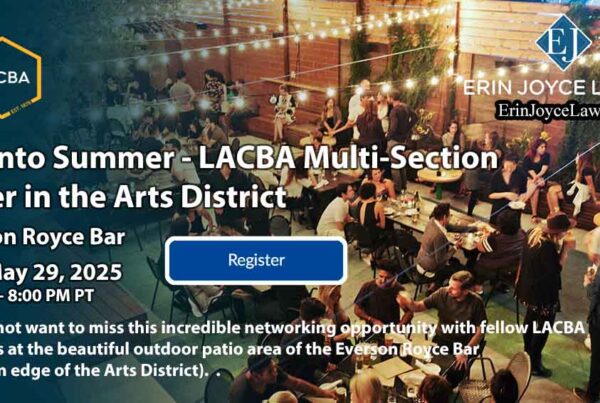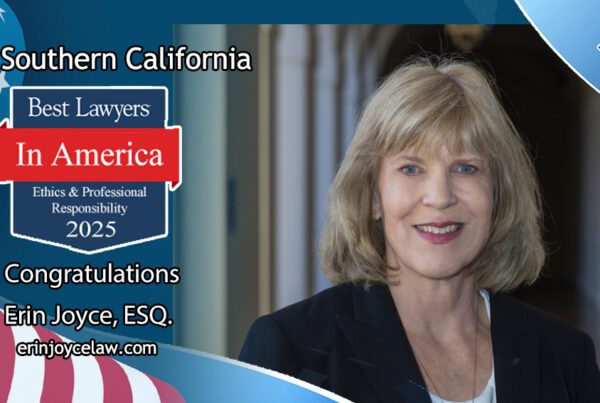Bar Proposals Will Upend Legal Profession
The State Bar’s proposals to authorize nonattorneys and for-profit corporations to practice law will upend the legal profession and harm California Consumers.
By Erin Joyce | Posted: 20 October 2019 Source: DailyJournal.com Title: Bar Proposals Will Upend Legal Profession Category: Law Practice, State Bar & Bar Associations
Bar proposals will upend legal profession
The State Bar’s proposals to authorize nonattorneys and for-profit corporations to practice law will upend the legal profession and harm California Consumers.
ERIN JOYCE
Email: erin@erinjoycelaw.com
Erin is a former State Bar prosecutor with over 18 years’ experience handling all types of attorney discipline cases, who now specializes in ethics consultations, moral character determinations and aggressive State Bar defense. Her office is in Pasadena, but she is available all over California to aid lawyers. If you have a question, don’t hesitate to ask …
The State Bar’s Task Force on Access through Innovation of Legal Services has recommended allowing nonattorneys and for-profit corporations to practice law in California and to share fees with attorneys. The stated purpose of the ATILS proposals is “to achieve the dual goals of public protection and increased access to justice.” (ATILS Report, p. 4) However, there is very little in the ATILS proposals which will directly affect the justice gap in California as we generally understand that term.
There are concrete things California attorneys can do to provide more legal services to the poor and underserved communities, like stepped up or even mandatory pro bono services, increased funding for legal aid and the courts, and streamlined court processes and enhanced access to court proceedings, like extended court hours and even night court. However the proposals of the ATILS Task Force to allow corporations to practice law, to authorize a new class of legal technicians to provide specified legal services, and to allow nonattorney ownership of law firms will not help provide more legal services to the poor.
The advent of LegalZoom and other online programs to provide document preparation
The advent of LegalZoom and other online programs to provide document preparation services to the public has not closed the justice gap. Innovation in the form of allowing for-profit corporations to practice law will not improve access to justice for the poor. Those consumers who use LegalZoom or other platforms lose many of the protections afforded to clients of attorneys, who are prevented by the Rules of Professional Conduct to prospectively limit their liability.
It is hard to ignore that these proposals emanate from Silicon Valley which sees the legal market as ripe for disruption. The legal tech companies and the venture capitalists behind them are not interested in providing “access to justice” for California’s poor; instead they see a way to take market share from California attorneys, most of whom work in small firms and solo practice. The Rules of Professional conduct exist to protect the legal consumer in California, and these rules are enforced through the attorney discipline system. Allowing for-profit corporations and nonattorneys to practice law will upend the legal profession and cause significant client harm.
It is a sure bet the State Bar sees regulation of a whole new class of licensees as a potential profit center. However, the State Bar does not have a great track record to date in policing its licensees (formerly, “members”). In 2018, approximately 370 discipline cases went to trial or were resolved by a disciplinary stipulation in State Bar Court. Of those cases, a whopping 80 cases resulted in full exonerations on all charges, meaning that the State Bar filed charges in over 20% of its cases without sufficient proof of misconduct! This statistic masks the many cases where the State Bar’s Office of Chief Trial Counsel makes an offer to settle which far exceeds the appropriate level of discipline based on the Standards and the actual provable misconduct. An attorney has to go through a full trial to get the appropriate level of discipline in those cases, incurring an exorbitant cost bill even though the State Bar achieves at trial far less than the attorney offered to stipulate to prior to trial. The Rules of Professional Conduct can only be enforced through the discipline system which affects an attorney’s license. How would the State Bar (or any other regulatory agency) police the actions of for- profit corporations or nonattorneys providing legal services in California?
Regulating nonprofit agencies to provide limited routine legal services to those most vulnerable who cannot afford attorneys may help bridge the justice gap. Limited entity regulation of nonprofits should maintain the core values of the provision of legal services, confidentiality, loyalty, competence and independence of professional judgment. These core values of our legal system are protected by the Rules of Professional Conduct which should govern all those who practice law in California. Any relaxation of the unlicensed practice of law rules to authorize the many to one possibilities of providing legal services through an online platform needs to protect the legal consumer by providing both confidentiality of the client communications. A client needs to be able to be fully candid with the lawyer (or online platform) from which the client seeks legal services in order to obtain competent legal advice.
It is irresponsible to entrust client confidentiality and the utmost duty of loyalty to
It is irresponsible to entrust client confidentiality and the utmost duty of loyalty to nonattorneys and tech companies who are in business to turn a profit. Where an attorney violating the Rules of Professional Conduct faces discipline up to disbarment, a for-profit corporation culpable of data breaches of clients’ most private information can simply fold. There is no safe mechanism for policing a corporation’s misconduct by the State Bar (or another regulatory agency).
The ATILS Task Force’s proposal to allow nonprofits to share fees with attorneys who recommend them or otherwise facilitate their employment makes sense. Currently, these nonprofits can only share court awarded fees. To tackle the justice gap head on, greatly expanding the reach of nonprofits to provide legal services to underserved communities is the answer. The other suggested changes to allow fee sharing with nonattorneys and nonattorney ownership of law firms will do nothing to provide additional legal services to the underserved communities. These proposals should not be the first solution to bridging the justice gap. Instead attorneys should be incentivized to provide more legal services to underserved communities, by tracking and possibly mandating pro bono services, and setting up referral programs for more effective delivery of “low bono” services.
The proposed changes to the advertising rules to allow solicitation by text messages or emails directed to those seeking legal services will not close the justice gap. One certain result of these proposed changes would be that for-profit corporations would begin to heavily advertise to garner market share by direct solicitations by email and text message. These advertisements will not be aimed at those clients who frequent legal aid, but instead the middle class consumer of legal services in California.
There are significant challenges facing the legal marketplace in California and the country. Many litigants cannot afford an attorney, and new ideas need to be tried to bridge the justice gap. However, the recommendations of the ATILS Task Force are not going to solve the access to justice problem in California, but would instead harm California consumers and upend the legal profession.
LAW IN THE NEWS

Sip into Summer – LACBA Multi-Section Mixer


Top Professional Responsibility Lawyers 2025
CONTACT ERIN JOYCE LAW
REPRESENTING CLIENTS THROUGHOUT ALL OF CALIFORNIA
When you get a letter from the State Bar, don’t go it alone! You need competent, experienced counsel to respond to the State Bar at every stage. Your license is at risk, so ensure you have the best representation from a former State Bar prosecutor before sending any response to an investigator or responding to formal charges leveled by the State Bar. You cannot make an informed decision without good advice. Call Erin now.











